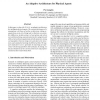Free Online Productivity Tools
i2Speak
i2Symbol
i2OCR
iTex2Img
iWeb2Print
iWeb2Shot
i2Type
iPdf2Split
iPdf2Merge
i2Bopomofo
i2Arabic
i2Style
i2Image
i2PDF
iLatex2Rtf
Sci2ools
104
click to vote
WEBI
2005
Springer
2005
Springer
An Adaptive Architecture for Physical Agents
In this paper we describe ICARUS, an adaptive architecture for intelligent physical agents. We contrast the framework’s assumptions with those of earlier architectures, taking examples from an in-city driving task to illustrate our points. Key differences include primacy of perception and action over problem solving, separate memories for categories and skills, a hierarchical organization on both memories, strong correspondence between long-term and short-term structures, and cumulative learning of skill hierarchies. We support claims for ICARUS’ generality by reporting our experience with driving and three other domains. In closing, we discuss limitations of the current architecture and propose extensions that would remedy them.
Differences Include Primacy | In-city Driving Task | Intelligent Physical Agents | Internet Technology | WEBI 2005 |
Related Content
| Added | 28 Jun 2010 |
| Updated | 28 Jun 2010 |
| Type | Conference |
| Year | 2005 |
| Where | WEBI |
| Authors | Pat Langley |
Comments (0)

